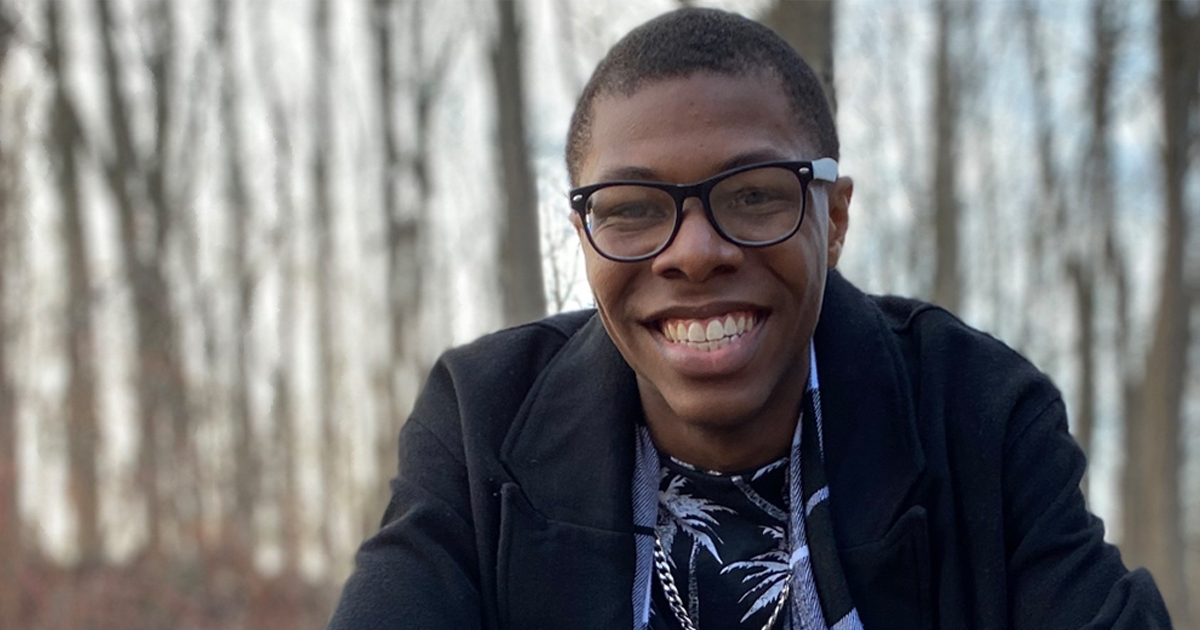

Fighting voter suppression in the presidential election
December 09, 2020 Written by Jessica Smith | Photo provided by Giovani Malcolm
Junior dean scholar Giovani Malcolm has a resume that would impress any campaign manager.
The political science and applied vocal performance major was a field organizer for the U.S. Vice President-elect’s campaign, Kamala Harris for the People, in 2019. More recently, he served as an organizing intern for President-elect Joseph Biden’s national campaign.
A friend of Malcolm’s worked on Biden for President (BFP) in Spring 2020 and encouraged him to apply for a Fall 2020 position. Two weeks after submitting his resume and cover letter, he was offered two different internships with two of the BFP teams.
“I realized that I really wanted to work in national organizing to work with organizers and canvassers and have more face-to-face experiences,” says Malcolm.
Typically, the internship would be based in a Philadelphia or Washington, D.C. office. But thanks to COVID-19 restrictions, Malcolm completed his work virtually. “The hands-on experience of working on a campaign was still absolutely thrilling,” he says. “I was able to make connections with my team and fellow interns through remote platforms and a series of brown-bag events. During a regular campaign, I wouldn’t interact as closely with anyone important as I have presently.”
Since the organizing team was intermingled with many different facets of the campaign, Malcolm’s daily tasks varied. “The organization team’s main goal was to get people to vote,” he says. “Collectively, we helped do that with all branches of the campaign.”
Some of his projects included planning virtual rallies for National Voter Registration Day and HBCU Homecoming Weekend. He also helped manage the relationship and workflow of the campaign with multiple translation firms for organizer scripts, coordinating with scheduling teams for Dr. Jill Biden and Doug Emhoff.
One of Malcolm’s biggest responsibilities in his role was helping with the creation of the campaign’s diversity, equity and inclusion training materials for all organizers, canvassers and BFP staff across the country.
“Some of the main goals of the materials and the training that we developed were to make virtual meetings more inclusive, help volunteers learn about ways to confront problematic incidents that may occur at their events and discuss availability and disability accommodation request processes for volunteer events,” says Malcolm.
Additionally, Malcolm researched types of voter suppression to implement new policies to combat the problem. He cites how Black voters in 2008, women of color in 2018 and Hispanic voters in battleground states were able to make a significant impact on election results.
“When the votes of people of color are not being suppressed, then their votes have drastically swung elections,” he says. “When we commit to voting, it makes voting easier for everyone else. When we flip statehouses, they enact pro-voting laws. By voting this time, it’s easier for communities to vote next time. This year had the most diverse eligible voting population with record numbers of women and young people running for office.”
While Malcolm helped create important changes that would improve the lives of many, the amount of work he undertook was understandably taxing. “The most challenging part of my internship was the balancing of all the different tasks that I would receive at once,” he says. “My time management skills were definitely tested as an undergrad taking 18 credit hours along with an extensive 40-hour internship.”
But he’s happy to say it was all worth it in the end. “The most rewarding part was seeing all my hard work pay off—having my candidate win the election, of course, but also seeing my work in action,” he says. “I drafted the framework for in-person canvassing and states like Pennsylvania, Arizona and Ohio adopted my guidance and put them into play.”
Malcolm’s internship helped him realize his career aspirations, as he hopes to do advocacy work in the future. “Working on the organizing team, I had the opportunity to hear so many stories from people who both hate and love Biden,” he says. “Taking those stories and advocating for those constituencies was so rewarding and I hope to continue that work in my career.”
If you’re looking to land your own internship in local or national elections, you don’t need Malcolm’s experience. He encourages other political science majors to be honest during the recruitment process. “Be yourself and don’t try to be anything that you are not,” he says. “My supervisor stated that she was drawn to my application because she saw I studied music and she loves classical music; that has nothing to do with my political experience, but it really grabbed her attention. [Campaign hiring managers] look forward to working with candidates who don’t know everything. They find joy in molding and shaping every candidate in their own special way, so not having experience is completely okay.”
For other UD students who are interested in pursuing professional opportunities, Malcolm urges taking advantage of the extracurricular activities the University has to offer. “My experience in clubs and RSOs really helped me answer those ‘describe a time’ questions,” he says. “I gained so many leadership, teamwork and personal growth experiences through my time working on the e-board of my a capella group YChromes and as a resident assistant. These experiences provide insight on how well-rounded you are as a person.”
